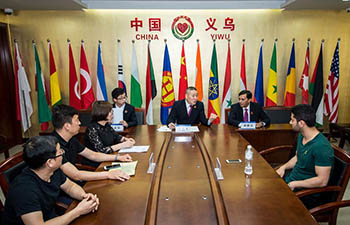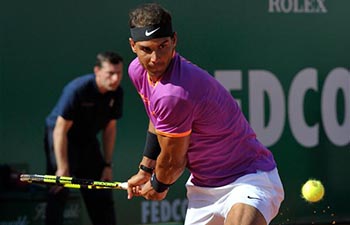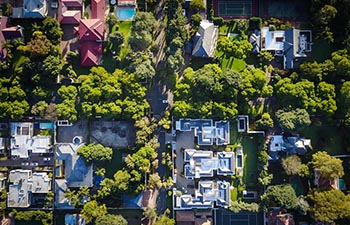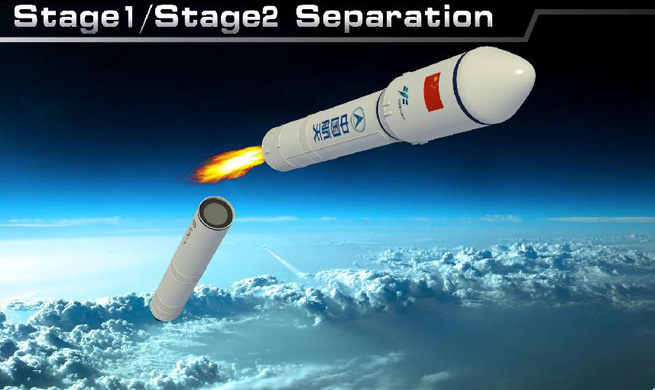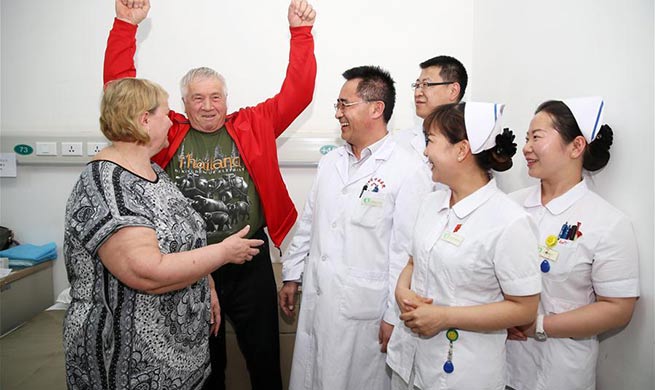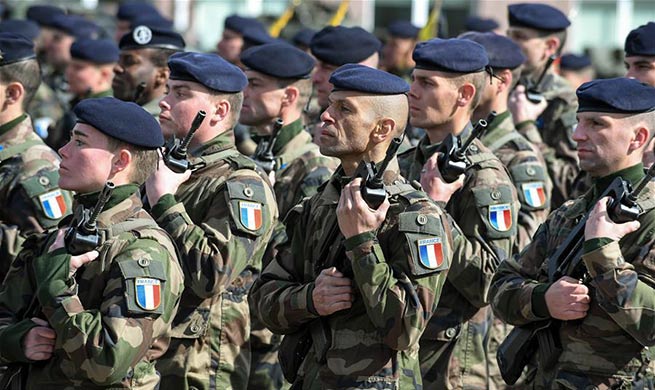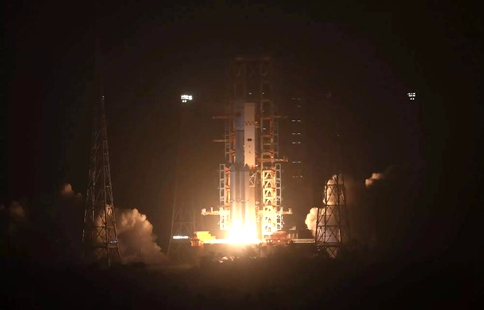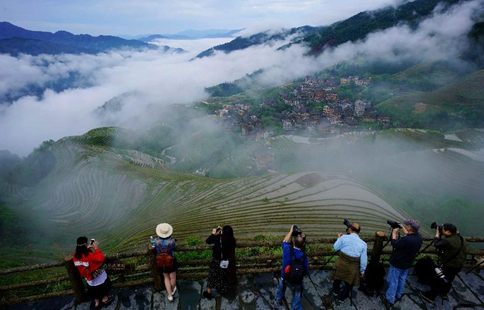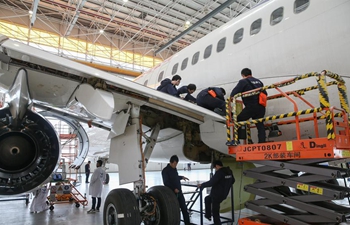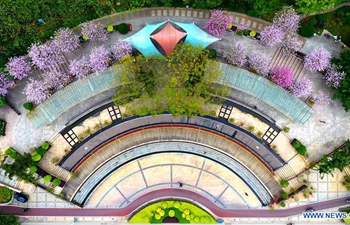by Hassan Rouhvand, Mu Dong
TEHRAN, April 21 (Xinhua) -- The one-month race of Iranian candidates for presidential position started on early hours of Friday day and will be followed by a waiting period until May 18.
Out of 1636 registered candidates, six qualified candidates, including three principalists, or conservatives as they are commonly referred to, plus three centrists and reformist for four-year terms.
For May 19 vote, the centrists, led by the President Hassan Rouhani, are hoping not to lose their current sovereignty.
The following is a biography of the six qualified candidates for the post announced on Thursday by Iran's Guardian Council of the Constitution as the highest legislative body of the country.
HASSAN ROUHANI
Hassan Rouhani was born on November 12, 1948. Rouhani is an Iranian politician and cleric who became the president of Iran in 2013. He began attending a seminary in Iran's Semnan province in the 1960s before travelling to Qom to complete his clerical training. He also studied at the University of Tehran, graduating in 1972 with a degree in law. He was arrested several times in the 1960s and 1970s for his opposition to the rule of Mohammad Reza Shah Pahlavi and his support for the late founder of the Islamic Ayatollah Ruhollah Khomeini. He fled Iran in 1977 and joined Khomeini in exile in France in 1978.
Rouhani returned to Iran after the Iranian revolution of 1979. He was elected to the parliament, also known as the Majlis, serving five consecutive terms between 1980 and 2000. He also held a variety of posts relating to national security during the Iran-Iraq War (1980-88). He served as a member of the High Council for National Defense and as the commander of Iran's air defenses. In 1989, he was appointed as the secretary of the Supreme National Security Council, a position that he occupied under centrist president Akbar Hashemi Rafsanjani (1989-97) and reformist president Mohammad Khatami (1997-2005). While serving in government, Rouhani continued his academic work, earning a Ph.D. from Glasgow Caledonian University in 1999 with a dissertation on Islamic law.
Between 2003 and 2005, Rouhani led the Iranian delegation in negotiations with the International Atomic Energy Agency (IAEA) and the international community regarding Iran's nuclear energy program. In that position, he developed a reputation among Western diplomats for moderation and pragmatism, but some hard-liners in Iran objected to Iranian concessions that included increased inspections and a temporary suspension of uranium enrichment. Rouhani resigned as Iran's chief nuclear negotiator and as the secretary of the Supreme National Security Council following the election of Mahmoud Ahmadinejad as president in 2005.
In March 2013, Rouhani entered the race for president, positioning himself as a critic of the outgoing Ahmadinejad's economic policies and confrontational approach to foreign affairs. He also stated that he would support restarting international negotiations regarding Iran's nuclear program in hopes of reducing sanctions against Iran. In Sept. 2013, he launched a diplomatic campaign to improve Iranian engagement with the West. His conciliatory overtures led to a telephone call with then U.S. President Barack Obama in late September, the first direct conversation between a U.S. and an Iranian leader since 1979.
Rouhani's pledge to restart international dialogue regarding Iran's nuclear activities was fulfilled in early November 2013 with the opening of talks between Iran and P5+1 comprising the United States, China, Russia, France, Germany, and the United Kingdom. An agreement was reached in July 2015 that required Iran to reduce its nuclear stockpile and allow inspections of its nuclear facilities in exchange for gradual reduction of sanctions.
In domestic policy, he has encouraged personal freedom and free access to information, has improved women's rights by appointing female Foreign Ministry spokespeople and has improved the economy by reducing inflation and raising the growth rate.
MOHAMMED BAQER QALIBAF
Qalibaf was born in 1961 and holds a doctorate degree in political geography. He is an Iranian conservative politician, former military officer and is currently serving as the Mayor of Tehran. He began his military career during the Iran-Iraq War in 1980s. After the end of the war in 1988, he became managing director of Khatam al-Anbia, an engineering firm affiliated to Iran's Islamic Revolution Guards Corps (IRGC). He served as the commander of the IRGC air force from 1996 to 1999. After large student protests in 1999, Qalibaf was appointed the national chief of police by Iranian Supreme Leader Ayatollah Ali Khamenei from 2000 to 2005. As the police chief he allowed women to join the force and set up electronic police services.
Qalibaf has been the mayor of the capital Tehran since 2005. As a mayor, he has won plaudits for building up the capital's infrastructure, improving public transportation, expanding subway, constructing bridges and highways and establishing new parks. He is also a pilot, certified to fly certain Airbus aircraft. Qalibaf ran for president in 2005, when he came in fourth place with just under 14 percent of the vote. He was also a candidate in the 2013 presidential election but lost to Rouhani, in second place.
EBRAHIM RAISI
Ebrahim Raisi was born on December 14, 1960. He entered Qom Seminary at the age of 15. According to his official biography, he holds a master's degree in the field of "International Private Law" from an undisclosed institution and was also graduated with a Ph.D. in "jurisprudence and fundamentals of Islamic law" from Shahid Motahari University.
In 1981, he was appointed the prosecutor of Iran's Karaj city. After four months, he was appointed as Prosecutor of Hamadan Province. He was appointed as deputy prosecutor of Tehran in 1985. After three years, he received special provisions from the late founder of the Islamic Republic Ayatollah Ruhollah Khomeini to address legal issues in some provinces like Lorestan, Semnan and Kermanshah. After Khomeini's death and election of Khamenei as the new Supreme Leader, Raisi was appointed as Tehran prosecutor. He held the office for five years from 1989 to 1994. In 1994, he was appointed as head of General Inspection Office.
From 2004 until 2014, Raisi served as first deputy chief of justice of Iran. He was later appointed as Attorney-General of Iran in 2014, a position that he served until 2016. Raisi was appointed by Khamenei on March 7, 2016 as the custodian and chairman of the Shrine of Shiite Imam Reza in the northeastern Iranian city of Mashhad. He officially announced his nomination in a statement published on April 6, and called it his "religious and revolutionary responsibility to run", citing the need for a "fundamental change in the executive management of the country" and a government that "fights poverty and corruption."
Raisi, who is commonly believed to be the main conservative rival of President Rouhani, called for "respect to the law" by both people and the officials. Democracy and democratic elections are attainable by reference to the people's vote and respect to the law, he said.
ESHAQ JAHANGIRI
Jahangiri was born on January 10, 1957. He graduated from University of Kerman with a degree of B.Sc. in physics. He was active in revolutionary groups prior to the Iranian revolution (in 1979) and once was wounded by the forces of the Shah Mohammad Reza Pahlavi. He later received his Ph.D from Iran University of Science and Technology in industrial engineering. Jahangiri began his political career following the Iranian revolution. He became deputy head of the agriculture department in Kerman in July 1980. Then, he was appointed its head in 1982. He was elected to the Iranian Majlis in 1984 election and served for two terms. He was appointed governor of Isfahan city 1992. He held the position until 1997 when he was picked by the reformist president Mohammad Khatami as the minister of Mines and Metals. His portfolio was later changed to the minister of Industries and Mines and he held that position until 2005.
He was also a potential reformist's candidate in 2013 presidential election but he withdrew in favor of Akbar Hashemi Rafsanjani and then became Rafsanjani's campaign manager. He was co-founder of Executives of Construction Party and served as its secretary general from 2006 to 2010. He was also a member of Mir-Hossein Mousavi's presidential campaign in 2009 presidential election. On August 4, he was appointed as the Vice President by Rouhani.
MOSTAFA AGHA MIRSALIM
Mostafa Agha Mirsalim was born on June 9, 1947. He is a conservative Iranian politician and engineer.
Mirsalim served as the national police chief following the Iranian revolution in 1979. He was proposed by, then, president Abulhassan Banisadr in July 1980 as a compromise candidate for prime minister acceptable to both Banisadr and the Majlis dominated, then, by the Islamic Republican Party. From 1979 to 1982, he served as the socio-political deputy of Interior Ministry. From 1981 to 1989, Mirsalim was the advisor to then president Ayatollah Ali Khamenei, and from 1989 to 1993 the advisor to the president Akbar Hashemi Rafsanjani.
Mirsalim was appointed Minister of Culture and Islamic Guidance in 1994. His tenure was characterized by a conservative Islamist direction, aiming to stave off the "cultural onslaught" of Western culture and promote pious Islamic culture. He was later appointed to the Expediency Discernment Council. Over the past years, he was affiliated to the Islamic Coalition Party and Islamic Republican Party. He is currently assistant professor of mechanical engineering at Tehran's Amirkabir University of Technology.
MOSTAFA HASHEMITABA
Mostafa Hashemitaba was born in 1946 and is known as an Iranian centrist politician. Hashemitaba is the M.Sc graduate of Textile engineering from Tehran Amir Kabir University. He also holds a degree in Analysis Systems from Iran's Industrial Management Organization. He served as Iran's minister of Industries from 1981 to 1982 under the President Mohammad-Ali Rajaiand. He was also vice president and head of National Olympic Committee of the Islamic Republic of Iran in 1994-2001 under the moderate president Akbar Hashemi Rafsanjani and the reformist president Mohammad Khatami.
He was a candidate in the Iranian presidential election in 2001, and was placed 10th. Hashemitaba is co-founder of the Executives of Construction Party and former member of its central committee. He has said that protecting the environment, holding up the agriculture as the country's basic industry, tackling the issue of the flow of immigrants to big cities, helping improve the life condition of low income strata of society as his priorities if elected the president. He has said that dealing with the problem of unemployment, the investments by the foreigners and private sector should be encouraged and supported, particularly in tourism sector. He has also pledged to fight corruption in economy.
For Iran's upcoming presidential election, slated for May 19, the campaigns officially began on early hours of Friday.






